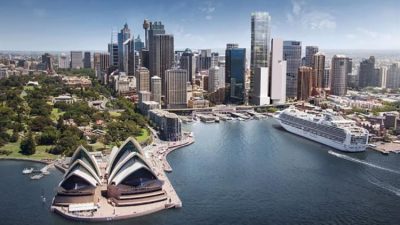
Wang Jianlin’s Wanda Way tune may sound a bit off-key these days
Dalian Wanda Group, once one of China’s most aggressive cross-border investors, has now reportedly put up for sale more than $5 billion of its remaining property projects in the UK, US and Australia, after the Chinese government ordered a review of lending to the company earlier this year.
The property conglomerate controlled by Wang Jianlin is said to have put its One Nine Elms project in London on the block, as well as US developments in Chicago and Los Angeles, together with a pair of properties still under construction in Australia, according to a report today in the South China Morning Post.
The reported asset sale, which was confirmed to Mingtiandi by market sources familiar with Wanda’s operations, comes less than three months after Wanda sold off a £470 million London housing project to a pair of mainland competitors, and follows a crackdown on lending for cross-border investments that is said to have specifically targetted Wanda, along with other mainland investors.
During August, Dalian Wanda Group transferred ownership in the UK, US, and Australian projects to a privately held company controlled by its chairman Wang Jianlin, in what many analysts saw as a preamble to an upcoming sale.
Looking for a New Owner for $5B in Dreams

Will Wanda’s Sydney project soon have a new owner?
Although China’s crackdown on outbound property investment has shown signs of loosening in recent weeks, the improving conditions may come too late to save Wanda’s sprawling overseas portfolio.
Mainland property professionals familiar with the country’s capital markets indicated that the company is marketing its overseas real estate assets both individually and as a package.
The reports today come after Wanda denied news accounts in August that it was trying to offload its $1 billion One Circular Quay project in Sydney and its $700 million stake in the Jewel resort project on Australia’s Gold Coast. Agents representing the Sydney project have indicated this month that the Circular Quay project will begin marketing condos soon. The Gold Coast casino has yet to sell out its 512 apartments after more than two years of sales.
Ad Hoc Strategy and Incomplete Projects

Wanda’s One Nine Elms was troubled before Wang bought it
Mainland property investors familiar with the company’s operations see Wanda’s current asset sale as a result of a misguided strategy. “The original international expansion was not what the capital markets wanted,” a source told Mingtiandi. “Further, the international acquisition strategy was flawed by an ad hoc selection process and shortsighted execution.”
Like the company’s Australian projects, Wanda’s One Nine Elms, which it acquired in 2013, remains incomplete. Described as a $1.1 billion undertaking by the Beijing-based firm, Wanda was still signing up contractors and sourcing construction materials for the project within the last two months.
In October the US partner in Wanda’s $1.2 billion One Beverly Hills development in Los Angeles was said to have made an early exit from the project, which has yet to begin construction. In Chicago, where Wanda’s Vista Tower has recently begun to make vertical progress, the company appears to be hawking its 90 percent stake in the $1 billion joint venture with Chicago’s Magellan Development Group. The 93-storey complex is slated to become the city’s third tallest building when it’s completed in 2020.
Wanda acquired the Los Angeles project in 2014 and the Chicago tower during the same year. The developer’s Sydney site was acquired in 2015, following its 2014 deal for the Jewel casino project.
Did Credit Downgrade Trigger a Cascade of Trouble?

Wang Jianlin (L), sold $2.9B in projects to Sunac’s Sun Hongbin, and R&F’s Li Sze-Lim (R)
While Wanda spent years building its portfolio, the company’s multi-continental empire has been under pressure since President Xi Jinping is said to have signed off on orders from banking regulators asking China’s big banks to scrutinise lending to the developer, along with HNA and Fosun, in June of this year. Later that same month, six of Wanda’s cross-border investments in entertainment firms were said to be singled out for restriction from further lending.
During July, Wanda quickly sold off $2.9 billion of its mainland properties to Sunac China and R&F Properties, and then in August it sold the newly acquired £470 million London site adjacent to its One Nine Elms to R&F Properties and Chongqing-based CC Land.
Despite this fire sale, both Moody’s Investors Service and S&P Global Ratings downgraded Wanda Commercial Properties’ credit rating to junk status in late September. This shift in the company’s credit-worthiness has triggered covenants requiring immediate payments on offshore loans totalling more than $1 billion, according to a report by Bloomberg.
“No doubt being downgraded to junk puts incredible pressure on the organization through higher refinancing and current debt service costs,” an industry source told Mingtiandi. “Wang has survived by aggressively moving forward – cash was created previously by selling residential units but the availability of projects and easy profits in China has shrunk.”
While Wanda is said to have applied to Chinese regulators for approval to transfer cash out of China to service its debt, a report today indicated that Dalian Wanda Group is looking for fresh sources of offshore credit to cover around $1.5 billion in international borrowing.
Leave a Reply